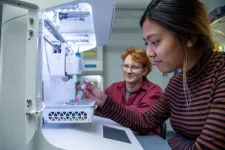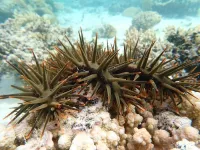(Press-News.org) DURHAM, N.H.—New Hampshire will boost its research leadership as an innovator in science and technology and increase its STEM workforce with investments across the state’s institutions of higher education, thanks to an $8 million grant to the University of New Hampshire from the National Science Foundation. The cooperative agreement award, one of just three of its type in the nation, aims to increase research opportunities, mentoring, training and partnerships between New Hampshire’s community colleges, four-year colleges and universities and industry.
“With this support, UNH will collaborate across New Hampshire to create a more robust research infrastructure that allows all institutions in the state to more meaningfully participate in funded research projects, building New Hampshire’s STEM workforce and driving the state’s innovation economy,” said Marian McCord, senior vice provost for research, economic engagement and outreach and principal investigator on the grant.
The initiative, called New Hampshire Long-term Investment to Fuel Transformative research (NH-LIFT), will provide several different opportunities—for students to pursue research experiences in areas that align with their interests; for academic and industry researchers to expand their research pursuits through external funding and accessible research infrastructure; and for the state to increase and retain a skilled workforce-ready population.
Among NH-LIFT’s initiatives are:
Developing a statewide network of research facilities to broaden access to advanced instrumentation and technical expertise.
Increasing student and early-career researcher success through cross-institution programming and partnerships that support research, mentoring, career development and retention.
Improving research support and service capacity at primarily undergraduate institutions and small businesses.
“New Hampshire’s research community drives scientific progress. It creates jobs, strengthens our local economy and addresses some of our nation’s most pressing challenges,” said Sen. Jeanne Shaheen, chair of the U.S. Senate Small Business and Entrepreneurship Committee and chair of the U.S. Senate Appropriations Subcommittee on Commerce, Justice, Science and Related Agencies. “I have no doubt that with this award the New Hampshire Long-term Investment to Fuel Transformational Research (NH-LIFT) project, spearheaded by the University of New Hampshire, will achieve great outcomes. Through collaborations like these, New Hampshire’s colleges and universities have shown they can train and deliver America’s next STEM leaders. This award is a win for the Granite State’s scientific community. I look forward to following and celebrating its results while continuing to fight for investments, through the EPSCoR program, that benefit the state of New Hampshire.”
“The NH-LIFT project encapsulates New Hampshire’s innovative spirit by bringing together New Hampshire colleges and universities with our businesses to drive our economy forward,” said Sen. Maggie Hassan. “I worked across the aisle to help develop and pass into law the Chips and Science Act so that projects like this one would be possible, and I’m excited to see $8 million coming to our state to help strengthen cutting edge research and our STEM workforce.”
Partners in the four-year NH-LIFT initiative are the Community College System of New Hampshire; UNH and Dartmouth College, the state’s two research universities; and primarily undergraduate-serving institutions Antioch University New England, Colby-Sawyer College, Franklin Pierce University, Keene State College, New England College, Plymouth State University and Saint Anselm College.
By engaging the full spectrum of post-secondary education in the state, NH-LIFT aims to expand opportunities to contribute to the state’s innovation-based economies to more students who are ethnically diverse, first-generation or from low socioeconomic backgrounds.
“To build sustainable research capacity, we are leveraging individual institutional strengths across the state and creating enduring networks,” said Melinda Treadwell, president of Keene State College. “At Keene State College, we look forward to building upon existing collaborative partnerships across the state to enhance opportunities for our students and faculty to engage in powerful research.”
NH-LIFT is supported by an award from the National Science Foundation EPSCoR Research Infrastructure Improvement E-CORE program. UNH also secured and managed NSF EPSCoR’s last major investment in New Hampshire, the $20 million NH BioMade initiative, which supports the state’s rapidly growing biomaterials industry.
The University of New Hampshire inspires innovation and transforms lives in our state, nation and world. More than 16,000 students from 49 states and 82 countries engage with an award-winning faculty in top-ranked programs in business, engineering, law, health and human services, liberal arts and the sciences across more than 200 programs of study. A Carnegie Classification R1 institution, UNH partners with NASA, NOAA, NSF, and NIH, and received over $210 million in competitive external funding in FY23 to further explore and define the frontiers of land, sea and space.
IMAGES FOR DOWNLOAD
Photo: https://www.unh.edu/unhtoday/sites/default/files/ksc_students.jpg
Caption: Undergraduate student researchers test samples in the Additive Biomanufacturing Lab at Keene State College.
Photo credit: William Wrobel / Keene State College
END
UNH receives $8M NSF grant to advance New Hampshire’s science and technology leadership
2024-05-15
ELSE PRESS RELEASES FROM THIS DATE:
The case for sharing carbon storage risk
2024-05-15
Even the most optimistic projections for the rapid build-out of solar, wind, and other low-carbon resources acknowledge that coal, natural gas, and other fossil fuels will dominate the world’s energy mix for decades to come. If the vast greenhouse gas emissions from burning these fossil fuels continue to enter the planet’s atmosphere, global warming will not be limited to sustainable levels. The capture and geologic sequestration of carbon emissions (CCS) offer a promising solution to the world’s carbon conundrum.
Even with growing technological maturity ...
Genetics provide key to fight crown-of-thorns starfish
2024-05-15
Scientists are one step closer to combatting coral-destroying crown-of-thorns starfish, following a University of Queensland study into the pest’s genetics.
In a world first study, University of Queensland PhD candidates Marie Morin and Mathias Jönsson analysed the genetics of the toxic coral-eating invertebrates found on the Great Barrier Reef.
“By understanding how crown-of-thorns (COTS) starfish genes work, we can unlock the mechanisms behind their key behaviours and find ways to stop them breeding,” Ms Morin said.
“In this study we looked at ...
Tiger beetles fight off bat attacks with ultrasonic mimicry
2024-05-15
Bats, as the main predator of night-flying insects, create a selective pressure that has led many of their prey to evolve an early warning system of sorts: ears uniquely tuned to high-frequency bat echolocation. To date, scientists have found at least six orders of insects – including moths, beetles, crickets and grasshoppers – that have evolved ears capable of detecting ultrasound.
But tiger beetles take things a step further. When they hear a bat nearby, they respond with their own ultrasonic signal, and for the past 30 years, no one has known why.
“It’s ...
Focus on diagnosing dyslexia is failing struggling readers, experts warn
2024-05-15
UNDER STRICT EMBARGO UNTIL 19:01 EDT TUESDAY 14 MAY 2024
An undue focus on diagnosing dyslexia is leaving many children without the help they urgently need, according to two leading educational and clinical psychologists.
The experts are calling for educators, psychologists and policy makers to rethink approaches to assessment and support for children who are struggling to learn to read.
In a new book, Professors Julian Elliott (Durham University, UK) and Elena Grigorenko (University of Houston, USA) argue that the clinical diagnosis of dyslexia is not only scientifically questionable, but current procedures are failing to serve the needs of many struggling readers, particularly ...
Most dangerous areas for whale shark-shipping vessel collisions revealed
2024-05-15
Researchers have found that heavily used shipping lanes pass through crucial whale shark feeding grounds, posing a threat to this endangered species.
Research published today (Wednesday 15 May) in Science of the Total Environment has revealed areas where the sharks are at the highest risk of colliding with large shipping vessels by mapping the locations of whale shark aggregations and overlaying them with information on shipping traffic.
“The almost ubiquitous overlap of at least some large shipping vessel traffic with whale shark aggregations underlines the magnitude of the threat the shipping industry ...
Petroleum, chlorine mix could yield harmful byproducts in new UH study
2024-05-15
A new study from the University of Hawaiʻi at Mānoa shows that chlorine mixed with petroleum in water can potentially produce inadvertent byproducts harmful to human health.
Small amounts of chlorine, within safe industry standards, are added to disinfect Oʻahu’s drinking water by the Honolulu Board of Water Supply (BWS) and military installations, according to BWS. In late November 2021, a petroleum release from the Red Hill Bulk Fuel Storage Facility contaminated the Red Hill ...
Novel inhibitor insights offer pathway to preventing PXR-associated drug resistance
2024-05-15
(Memphis, Tenn. – May 14, 2024) Deaths from cancer or infections can occur when available treatments are ineffective. Once turned on, pregnane X receptor (PXR) activates the expression of genes encoding enzymes that metabolize external chemicals, including drugs. This causes a significant drop in the effectiveness of chemotherapy, antivirals and other pharmaceuticals. Blocking the PXR activity is notoriously difficult, as many drugs that bind the protein, whether intentionally or unintentionally, activate it. Scientists at St. Jude Children’s Research ...
Higher income reduces stroke mortality risk by a third, new study shows
2024-05-15
(Wednesday, 15 May 2024, Basel, Switzerland) New research, presented today at the 10th European Stroke Organisation Conference (ESOC) 2024, has revealed that high-income individuals have a 32% lower risk of post-stroke mortality.1 Additionally, those with a higher education have a 26% lower risk of death post-stroke, highlighting striking disparities in stroke survival based on key social determinants of health (SDoH).
The register-based study analysed data from 6,901 stroke patients in Gothenburg, Sweden between November 2014 to December 2019 to examine ...
Text messages with financial incentives for men with obesity
2024-05-15
About The Study: Among men with obesity, an intervention with text messaging with financial incentive significantly improved weight loss compared with a control group, whereas text messaging alone was not significantly better than the control condition. These findings support text messaging combined with financial incentives to attain weight loss in men with obesity.
Quote from corresponding author Prof. Pat Hoddinott, M.B., B.S., Ph.D.:
“Losing weight can make people feel better, reduce their risk of many health problems such as diabetes, and helps the health service with their aim to keep ...
An adaptive behavioral intervention for weight loss management
2024-05-15
About The Study: A wireless feedback system (Wi-Fi activity tracker and scale with smartphone app to provide daily feedback) was not noninferior to the same system with added coaching. Continued efforts are needed to identify strategies for weight loss management and to accurately select interventions for different individuals to achieve weight loss goals.
Quote from corresponding author Bonnie Spring, Ph.D.:
“With U.S. obesity prevalence projected to reach 49% by 2030, limited obesity treatment resources need to be spread across more of the ...




